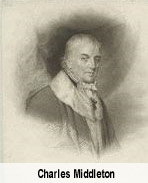Clan Middleton People
 Charles Middleton, 1st Baron Barham (1726 – 1813)
Charles Middleton, 1st Baron Barham (1726 – 1813)
British naval officer and politician, he was born in Leith, Edinburgh.
Middleton entered the Royal Navy in 1741 as captain’s servant. He became lieutenant in 1745, and served during the Seven Years War. In 1759 he was given command of the frigate HMS Arundel. The following year, while in command of HMS Emerald, distinguished himself in the West Indies, taking sixteen French ships and several privateers, and received the gratitude of the merchants in the British colony of Barbados.
Middleton was created a baronet and in 1784 was elected Tory Member of Parliament for Rochester, a seat he held for six years, and three years later was promoted Rear Admiral. He was later made a Lord of the Admiralty, and in 1795 became Admiral of the Blue. He was finally, in 1805, appointed First Lord of the Admiralty, and was created Baron Barham, of Barham Court and Teston in the County of Kent. In September 1805, Lord Barham attained the rank of Admiral of the Red. He died eight years later aged 86 at his home of Barham Court.
In addition to his service in the Royal Navy, Sir Charles Middleton played a crucial role in the abolition of the slave trade in the British Empire. While Middleton never played a direct role in the effort to abolish the slave trade (accomplished 1807) and slavery itself (in 1833) by talking out about it whilst an MP, he played a very important part as a behind the scenes facilitator.
John Middleton, 1st Earl of Middleton (1619 – 1674)
In early life he served as a soldier in France; later he fought against Charles I both in England and in Scotland, being especially prominent at the Battle of Philiphaugh and in other operations against the great Montrose. He held a high command in the Scottish army which marched to rescue the king in 1648, and he was taken prisoner after the Battle of Preston. He joined Charles II when that monarch reached Scotland in 1650.
In 1653, Middleton was chosen by Charles II to head the projected rising in Scotland. He reached Scotland in February 1654, but the insurrection was a complete failure. Its leader, who could not be held responsible for this result, remained in Scotland until 1655, when he rejoined Charles II, who created him Earl of Middleton in 1656.
He returned to England with the King in 1660 and was appointed commander-in-chief of the troops in Scotland and Lord High Commissioner to the Scottish parliament, which he opened in January 1661. He was an ardent advocate of the restoration of episcopacy, this being one reason which led to serious dissensions between the Earl of Lauderdale and himself, and in 1663 he was deprived of his offices. He was afterwards (1667) governor of Tangier, where he died in June 1674.





